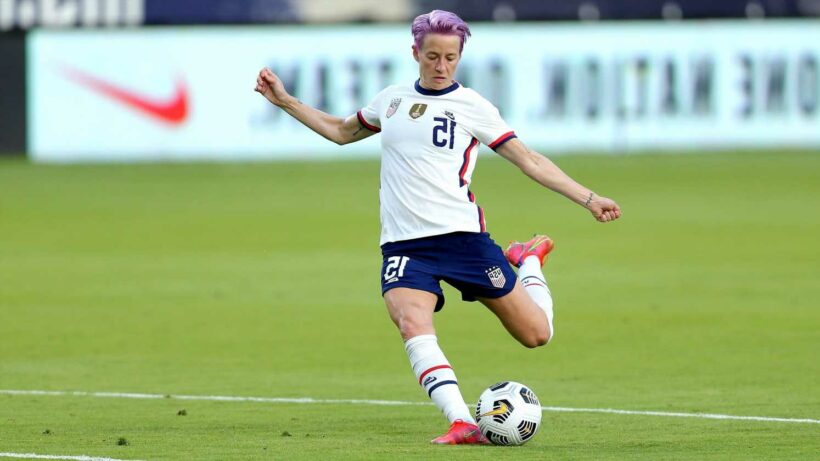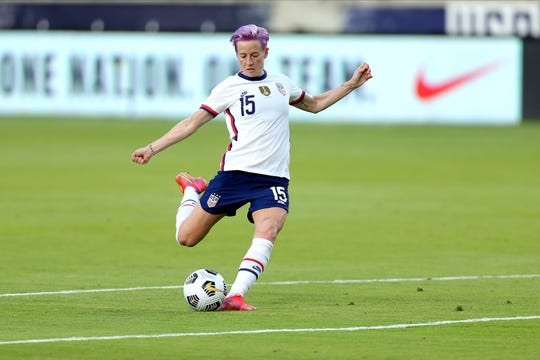The world sees Megan Rapinoe as the ultimate badass, as unflappable in confronting ignorance and inequality off the field as she is fearless on it.
Yet every woman can identify with the two-time World Cup champion as she is seen sitting in the back of a car, exhausted and frustrated by a fight for equity that has been raging for decades.
“It’s not easy to constantly have to demand your worth. Or tell people how good you are. Or tell people you deserve to be a full human,” Rapinoe says in LFG, a new documentary on the U.S. women’s equal pay lawsuit against U.S. Soccer that begins streaming Thursday on HBOMax.
Filmmakers Andrea Nix-Fine and Sean Fine, who won an Oscar in 2013 for their short documentary Inocente, began exploring the idea for the film in 2019, after the U.S. women sued U.S. Soccer for gender discrimination, claiming they had been paid less than the U.S. men’s team. No other women’s sports team had sued their employers before, let alone three months before a World Cup, and Nix-Fine and Fine were intrigued.
“We wanted to go beyond headlines, beyond soundbites and show what it was like to truly take on your employer,” Fine said.
The documentary features Rapinoe, Jessica McDonald, Sam Mewis, Kelley O’Hara, Christen Press and Becky Sauerbrunn, as well as members of the players’ legal and public relations team. The behind-the-scenes access is extraordinary, including screen shots of group texts and footage of late-night conference calls and Zoom meetings, and shows just how intimately involved the players are while still being successful athletes, for club and country.
United States forward Megan Rapinoe has been the voice for the women's national team in its fight for equal pay. (Photo: Erik Williams, USA TODAY Sports)
Because U.S. Soccer chose not to cooperate — Nix and Nix-Fine said they asked, twice — the film is, not surprisingly, extraordinarily sympathetic to the players. U.S. Soccer will no doubt take issue with some of the assertions made in the film, but that also misses the point.
Yes, LFG is the story behind the U.S. women’s lawsuit. But it’s really a larger story about equity and equality, and how every woman is still fighting for it.
“What’s so concerning is the players just feel this absolute lack of respect for who they are and what they do,” Molly Levinson, spokeswoman for the players, says in the film. “And it doesn’t just apply to the federation. It’s just everyone around them in the ecosystem.
“The sad thing is a lot of these people are men,” Levinson added. “It’s not that men are incapable of showing respect or acknowledgment, but a lot of these men are.”
Substitute finance, engineering, academia or, really, any other career, and what Levinson says still applies. It’s why this team, in addition to its decades of success, has struck such a chord with the general public.
When fans broke out in chants of “Equal pay! Equal pay!” after the U.S. women beat the Netherlands for the World Cup title in 2019, it wasn’t just in support of the players. It was a primal scream on behalf of all women.
“Me being a man, it’s been interesting. What I learned throughout the filming process is the issue of value, and how you value that person sitting across from you,” Fine said. “I hope the film makes, especially young boys and men, speak up and see that people are not being valued.
“Our company is called Change Content,” he added. “We want the film to make change.”
The players have said repeatedly that their lawsuit is more about ensuring a level playing field for the next generation than for themselves, and that theme runs through LFG. Footage of the 1999 team, as well as an interview with Julie Foudy on that team’s fights with the federation, contrasts with a scene of a little girl escorting Rapinoe into a building for a television appearance and then sitting beside her in wide-eyed wonder.
A judge dismissed the U.S. women’s equal pay claim in May 2020, but they are appealing that ruling.
“I always thought, from the very beginning of this, that even if we came out of this and we went to trial and we lost, jury decision, that there was so much significance in the fight and so much importance,” Sauerbrunn said. “So that’s what we’re going to do. We’re going to continue to fight.”
It is not lost on Nix-Fine that when they began LFG, the U.S. women were embroiled in a lawsuit with the federation they were about to represent at a major international tournament. Now, as the film is being released, the circumstances remain the same.
Mewis, O’Hara, Press, Rapinoe and Sauerbrunn were all on the Olympic roster that was announced Wednesday, and they begin their pursuit of the gold medal in Tokyo on July 21. Two days later, their brief in the appeal is due.
“Hopefully everyone who sees the film will look at what they’re fighting for in a new way as they step on the field,” Nix-Fine said.
And recognize that this fight isn't just about one team. It's for all women.
Follow USA TODAY Sports columnist Nancy Armour on Twitter @nrarmour.
Source: Read Full Article

